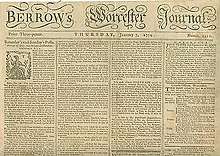Berrow's Worcester Journal
Berrow's Worcester Journal is a weekly freesheet tabloid newspaper, based in Worcester, England. Owned by Newsquest, the newspaper is delivered across central and southern Worcestershire county.
| The world's oldest newspaper: Established 1690 | |
 Berrow's Worcester Journal Header | |
| Type | Weekly Freesheet Newspaper (Thursday) |
|---|---|
| Format | Tabloid |
| Owner(s) | Newsquest Media Group Subsidiary of Gannett |
| Founded | 1690[1][2] |
| Headquarters | Berrow's House Hylton Road Worcester WR2 5JX. |
| City | Worcester |
| Country | England, UK |
| Circulation | 31,428 (as of January 2017 - December 2017)[3] |
| Sister newspapers | Worcester News |
| OCLC number | 31683341 |
| Free online archives | http://www.berrowsjournal.co.uk |
History
16th Century Printing Press
Worcester was one of the earliest locations in Britain to have a printing press where its first press was established in 1548[4] and set up by John Oswin who printed several books on it between 1548 and 1553.[5]
Stephen Bryan
The first established records of a Worcester newspaper date from 1690 when Stephen Bryan founded the Worcester Post-Man, which has been published ever since, although its name changed to the Worcester Journal and then to the current name Berrow's Worcester Journal, thus laying claim to being the oldest newspaper in the world in continuous and current production.[6][7]
Local news was relatively rare in the first decade of publication and it was published irregularly from 1690 until 1709, the period following the deposing of James II (& VII) after the Glorious Revolution of 1688 which had seen the beginning of a free press in the country. After about 1720 Bryan began to include more local items.[8] In the time that Bryan owned the paper it was published on Fridays.[9]
Berrow Family

In April 1748, Bryan sold the paper to Harvey Berrow who changed its name to The Worcester Journal and its publication day to Thursday.
From 11 October 1753 the paper was published as Berrow's Worcester Journal.[10]
This final name change was prompted when a competitor, Richard Lewis, tried to profit from the success of the Worcester Journal by launching the similar-sounding New Worcester Journal. Lewis's other efforts to take market share from the older paper included publishing on Wednesdays (the day before Berrow) and circulating a report in Bewdley, Kidderminster, and Stourbridge that Berrow's newsmen had left his service.[11]
Berrow was the third son of Capel Berrow (died 1751), a clergyman, and younger brother of Capel Berrow the writer,[12] and was an apothecary in Peterborough. This was not unusual during this time as early newspaper proprietors would sell medicines alongside their newspapers. Berrow promoted in his paper his elixir for dropsy and his powder for gout. The paper was sold for 2½d every week with five pages.
Harvey Berrow carried on the Journal until his death on 16 August 1776, when his eldest son, also Harvey Berrow, continued the publication until his death in the following year, on 11 June 1777. The newspaper was succeeded by his sister, Elizabeth Berrow, whose name appeared upon the Journal until 23 December 1779, after which her name is superseded by that of John Tymbs, to whom she was married on 23 September 1779.[13]
Present Era
In 1982 Berrow's Worcester Journal was taken over by Reed International.[14][15] The style of the newspaper changed on 26 June 1987[14] when it became a free newspaper.
In 1990, the newspaper celebrated its Tercentenary (1690-1990) and specially commissioned china was produced by Royal Worcester Porcelain, at its nearby city factory, to mark the historic occasion.[14]
Although the Berrow family have long ceased to have any connection with the paper, their name has perpetuated and the paper continues to be published weekly.
Alongside free doorstep delivery, the newspaper is accessible as a free and unsubscribed online edition.
Citations
- "World's oldest newspaper celebrates its 325th birthday". Worcester News. Worcester. 21 October 2015. Retrieved 30 July 2016.
- "History of British newspapers". News Media Association. London. 2015. Retrieved 30 July 2016.
- "Audit Bureau of Circulation: Summary Report – Worcester Journal (Berrow's)". Abc.org.uk. Retrieved 29 July 2016.
- Worcester Civic Society (2015). "Vol.9 Issue.2" (PDF). Newsletter. Worcester. Archived from the original (PDF) on 14 August 2016. Retrieved 30 July 2016.
- "Worcester Printing "Where it all began" - page 2". Worcester News. Worcester News. Retrieved 30 July 2016.
- "Berrow's Worcester Journal - History of the newspaper". Worcester News. Newsquest. Retrieved 25 October 2013.
- Franklin, Bob; Hamer, Martin; Hanna, Mark; Kinsey, Marie; Richardson, John E (2005). "Institutions". Key Concepts in Journalism Studies. SAGE Publications. p. 298. ISBN 0 7619 4481 8.
- Wiles, p. 257
- Wiles, p. 65
- Wiles, p. 506
- Wiles, p. 91
- Cooper, Margaret. "Berrow, Harvey". Oxford Dictionary of National Biography (online ed.). Oxford University Press. doi:10.1093/ref:odnb/70356. (Subscription or UK public library membership required.)
- "Newspaper Surveys Berrow's Worcester Journal". Archived from the original on 17 August 2016. Retrieved 30 July 2016.
- "History of the newspaper - Berrow's Worcester Journal". Retrieved 30 July 2016.
- "Timeline". Reed Elsevier. Archived from the original on 30 October 2015. Retrieved 19 September 2015.
References
- Cooper, Margaret, The Worcester Book Trade in the Eighteenth Century, Occasional Paper Number 8, Worcester Historical Society, Worcester, 1997.
- Green, Valentine, History and Antiquities of the City and Suburbs of Worcester (2 vols.) Bulmer, London, 1796.
- Wiles, R[oy] M[cKeen], Freshest Advices: Early Provincial Newspapers in England, Ohio State University Press, 1965.
External links
- Berrow's Worcester Journal website
- Freshest Advices: Early Provincial Newspapers in England at the Ohio State University Press website.
- Transcripts of Georgian Editions (1756 onward) of Berrow's Worcester Journal from copies from Mr Berrow
- Introduction to history of Berrow's Worcester Journal.